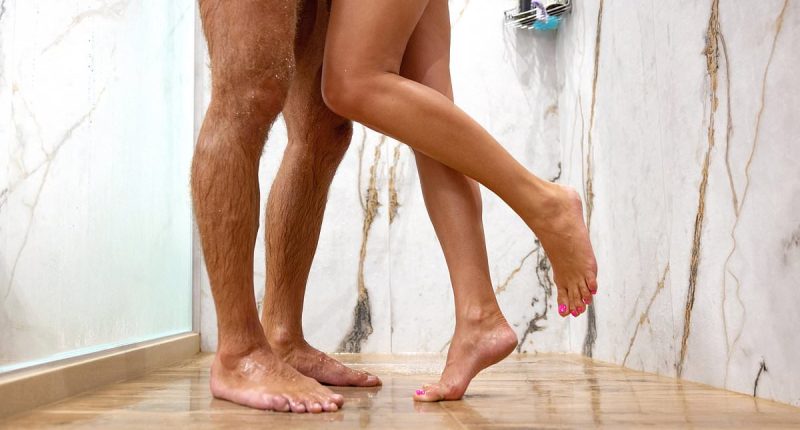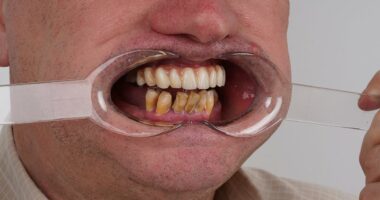Share this @internewscast.com
When nature calls, you should always answer it – unless, that is, you happen to be in the shower.
Emptying your bladder in the shower may seem like no big deal – but women relieving themselves standing up could actually be causing long-term harm.
Nurse Kingsley, who works at a Kentucky-based breast health clinic, recently took to social media to warn her followers to not pee standing in the shower.
The women’s health advocate noted that the practice could lead to bladder leakage -a common condition where the bladder loses control and causes urine to leak out of the body.
Over time, this can increase the risk of urinary tract infections and pave the way for other complications such a kidney infections, sepsis and permanent kidney damage.
Kingsley said: ‘Hot take but don’t pee standing up in the shower or anywhere for that matter.
‘Ladies you are training your bladder that it’s okay to empty while standing. Don’t do it! This could cause bladder leakage.’
And the warning comes weeks after a Talker Research survey found that about 45 percent of Americans pee in the shower on a regular basis.
The team discovered that out of the 2,000 Americans surveyed, 20 percent of women and 30 percent of men indulged in the practice without any worry.

Experts have finally revealed the truth about whether it is safe to urinate standing up in the shower for both men and women (stock image)
For decades, men have been able to comfortably pee standing up due to the support provided to them by their prostate gland – the male reproductive organ which is responsible for urine flow.
However, women do not have an equivalent organ that can provide support to their kidneys and urinary tract as they stand to pee.
This lack of support can put the bladder under extra strain and make it harder for the bladder to fully empty.
Additionally, the structure and strength of the pelvic floor muscles also varies between the genders. Pelvic floor muscles work with the bladder to store and release urine.
To empty your bladder comfortably and allow urine to flow freely, it is necessary for women to allow the pelvic and bladder muscles to completely relax – which can only be achieved while sitting down.
Even peeing in the shower with one leg up on the wall may also not be safe for your kidney and bladder health.
Similarly to standing, the pelvic muscles are unable to completely relax in this position and leave the bladder half full with urine.
Standing and ‘hovering’ over the drain can also keep these muscles slightly constricted, making it hard to fully empty the bladder.
Over time, stagnant urine in the bladder may lead to the development of dangerous bacteria and potentially cause infection.
This infection can cause bladder leakage and a constant stream of urine to flow from the body – which can become a breeding ground for more bacteria to grow in the urinary tract.
Eventually, this can cause complicated urinary tract infections. If left untreated, the bacteria can also travel up from the urinary tract to the kidneys, resulting in a kidney infection.
This can contribute to permanent kidney damage, including scarring, and may increase the risk of high blood pressure and anemia.

Kingsley, who works at a Kentucky-based breast health clinic, recently took to social media to warn her followers to not pee standing in the shower
Furthermore, exposure to urine – such as that flowing down your leg in the shower – can irritate the skin, leading to redness, rashes and even infections, especially in areas like the buttocks, genitals, and perineum.
However, despite serious dangers, Americans continue to pee in their shower and experts say it is due to their need to multitask.
Clint Kreider, licensed marriage and family therapist with Still Water Wellness Group explained to Talker Research: ‘Peeing in the shower often reflects our modern obsession with multitasking – even in moments meant for relaxation.
‘For some, it’s a cheeky rebellion against societal “rules”, for others, it’s sheer efficiency. Why wait when you’re already there?
‘Habits formed in private spaces often mirror how we handle stress. If shower-peeing becomes a compulsive need to ‘optimize’ every second, it might signal deeper anxiety about time scarcity.
‘Ladies, pelvic floor therapists rightly warn that hovering or ‘pushing’ mid-shower could tense muscles unnecessarily. Think of it as a metaphor: Forcing anything (even pee) under pressure rarely ends well.’
And while it’s largely the norm for men to urinate standing up, it could also prove dangerous for those who have a history of urine flow issues or have an enlarged prostate.
An enlarged prostate can cause frequent urination, especially at night, a weak or interrupted urine stream, difficulty starting to urinate, a feeling of incomplete bladder emptying, and urinary incontinence.
This can also pave the way for a breeding ground of harmful bacteria and cause similar infections in men as in women.















